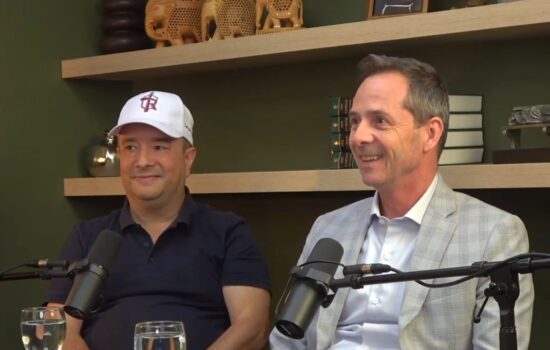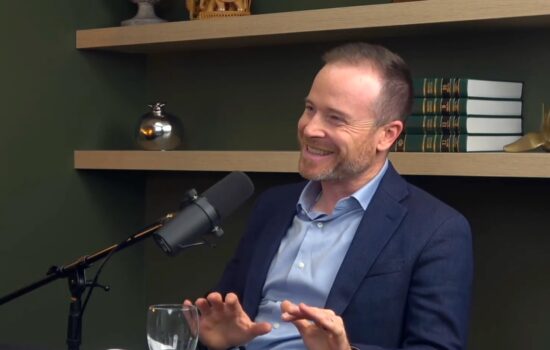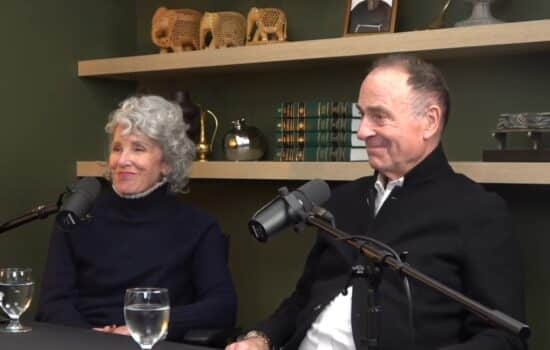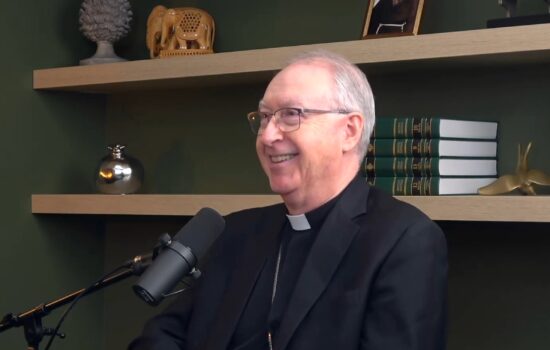Chapters:
00:00 Intro
06:10 What Are Super Habits?
10:26 Virtues by Any Other Name
14:49 Why Character Formation Matters in Schools
18:22 How to Teach and Practice Virtue
25:09 Measuring Growth in Virtue: The Grow Virtue App
33:56 Creating Safe, Values-Based Education in a Confused World
35:04 Deliberate Character Formation: Teaching Virtue with Purpose
36:22 Ancient Wisdom Meets Modern Science: The Virtue of Diligence
40:00 Virtue as Human Excellence: Activating the Muscles of Character
46:48 St. Thomas Aquinas’ Taxonomy of Virtues Explained
53:32 The Vision and Mission of St. John Paul II Academy
1:02:08 Capitalism, Socialism, and Virtue: A Catholic Perspective
If you are interested in our school, make sure to check out our website:
https://www.sjp2academy.com/
Follow us on social media:
Watch on YouTube
Instagram: https://www.instagram.com/sjp2academy/
Facebook: https://www.facebook.com/sjp2academy
X (formerly Twitter): https://x.com/SJPIIAcademy
In this episode of Catholic Education Matters, host Troy Van Vliet is joined by businessman and philanthropist Andy Szocs and Dr. Andrew Abela, Dean of the School of Business at The Catholic University of America for a compelling conversation centered on the power and purpose of virtue in education and leadership. Dr. Abela discusses his book Super Habits, which reintroduces the classical concept of virtue—not as outdated moralizing, but as deeply relevant habits of excellence essential for human flourishing. Drawing from both ancient wisdom and modern research, he explains how virtues such as courage, temperance, self-discipline, and orderliness are foundational to character formation and ethical leadership. The episode explores how these virtues can and should be deliberately taught and practiced—not just assumed—within schools, universities, and organizations. Dr. Abela shares how his team is incorporating virtue development into curriculum at the university level and introduces the Grow Virtue app, a tool that helps users identify strengths and areas for growth through self-assessment and intentional daily practices. The discussion reinforces that true education must go beyond academic achievement to shape morally grounded individuals capable of making principled decisions in complex, real-world situations.
Transcript:
[00:00:00] Intro: Welcome to Catholic Education Matters, the podcast that celebrates the beauty of Catholic education, highlighting excellence in academics, athletics, and the transformative power of faith. Join us as we share the stories of those making a lasting impact on Catholic education. Let’s begin.
[00:00:32] Troy Van Vliet: Welcome, everybody, to another episode of Catholic Education Matters. My name is Troy Van Vliet, and, I am really excited today to have with me, as our guests, Andy Szocs and Dr. Andrew Abela.
[00:00:40] And I’ll start out by saying a few words about Andy. Andy, one of my favorite people. An absolute absolutely amazing person, not only, an incredible successful businessman, but a someone who’s setting a huge example as a philanthropist as well. And he’s a supporter of Catholic education. And, Andy, welcome, and thank you for joining us here today.
[00:01:09] Andy Szocs: Absolutely delighted to be here.
[00:01:12] Troy Van Vliet: Alright. And now, Andy, you introduced us to Dr. Andrew Abela. Yes. So excited to have you’ve spoke about him for many time for on many different occasions, and we’re promoting him to us also through the NAPA Institute as a speaker there, and you’ve known him for several years now. And, Dr. Abela, I wanna welcome you here today before I read your bio because it’s extensive, and I want everybody to know your background and what you do.
[00:01:45] And rather than me trying to fumble through it, I thought we’re just I’m just gonna read it out. But thank you for joining us here today. First of all, Dr. Abela is a distinguished academic and a thought leader in the field of business ethics and Catholic education, which is very fitting for our show, of course, here. He currently serves as professor and dean of the School of Business at the Catholic University of America, where he’s dedicated to fostering a curriculum that integrates ethical principles and practical business applications.
[00:02:26] Dr. Abela holds a PhD in business from the University of Notre Dame, where he focused on the intersection of faith and business practices. His research interests include the role of ethics in corporate governance, the impact of moral philosophy on business decision making, and the importance of integrating Catholic social teaching into business education. In addition to his academic pursuits, Dr. Abela is a sought after speaker and consultant, frequently engaging with organizations and institutions to promote ethical leadership and responsible business practices. He has published numerous articles and papers in a reputable in reputable journals, including a new book, contributing to the discourse on how business can operate with integrity while achieving success. A passionate advocate for the importance of Catholic education, Dr. Abela believes in the transformative power of education to shape not only skilled professionals, but also principled leaders who can navigate the complexities of the modern business landscape.
[00:03:34] He is committed to mentoring students and fostering an environment where they can grow in both their professional skills and their moral character. Outside of his professional life, Dr. Abela is actively involved in his local community and church where he seeks to live out his faith through service and engagement. He is dedicated to helping others understand the value of ethical decision making and the role it plays in creating a just and compassionate society. Dr. Abela’s work continues to inspire students, educators, and business leaders alike as he champions the integration of faith and ethics in the world of business. Welcome, Dr. Abela.
[00:04:18] Dr. Andrew Abela: Thank you. Good to be here. I have to correct one small thing, Douglas. My doctorate’s from the University of Virginia, not Notre Dame.
[00:04:25] Troy Van Vliet: Ah, okay.
[00:04:26] Dr. Andrew Abela: Just to clarify that I’m not flying on the false colors here.
[0:04:29] Troy Van Vliet: We may have we may have put that in there just for dramatic purposes. That’s good. That’s good. But I’m glad you caught that. We wanted to make sure you were paying attention as we were going through this.
[00:04:41] Dr. Andrew Abela: I was paying attention.
[00:04:43] Troy Van Vliet: And you and you nailed it. So that was that was a long introduction. Actually, it’s one other thing I wanna mention just about Andy before we get into this. Andy, you also have championed the new build of the Our Lady of the Mountain Parish in Whistler, British Columbia as well. And I wanted to say congratulations on that.
[00:05:03] And I also wanted to say thank you for your support in championing that and putting that together. It was well it it’s been needed up there for a long time, and we’re gonna be so proud when we’re up at Whistler to be attending mass at the new the new church there. So congratulations, and thank you.
[00:05:22] Andy Szocs: And we’re hoping that’s gonna be in October this year. So we’re closing in on it, and everything looks extremely promising. And it’s just a ton of miracles with the holy spirit and a lot of effort.
[00:05:38] Troy Van Vliet: That’s great. That is awesome. That’s awesome. Have you have you, Dr. Abela, have you visited Andy up at Whistler ever?
[00:05:45] Dr. Andrew Abela: I haven’t. I’ve been to Whistler a couple of times, but I’ve never Andy and I usually meet in Northern California, I think right Andy? Maui. And Maui, that’s right. I lived for twelve years in Canada and my parents still live up in Toronto so I visited Vancouver many times, worked there for a while, but that was all before I met Andy.
[00:06:10] So yeah, Maui is a warmer place to meet.
[00:06:14] Troy Van Vliet: Perfect. I I don’t blame you. And originally you’re from Malta. Is that correct?
[00:06:19] Dr. Andrew Abela: I am. I am. Yeah.
[00:06:21] Troy Van Vliet: Alright. Okay. Good. So one of the things we wanted to talk about right out of the gate is your book titled Super Habits. And we were discussing that before we started the podcast.
[00:06:38] What a great I haven’t read it, admittedly. It’s on my list now, of course, now that I’ve reviewed it as well and had a look at it chapter by chapter. Can you tell us a little bit about what’s inspired you and how this book came about, Dr. Abela?
[00:06:56] Dr. Andrew Abela: I noticed that there were kind of indications of a renewed interest in the idea of virtue, in a number of areas, in psychology, in management, but nobody was using the word virtue, but they were sort of approaching the idea, the idea of a virtue as a habit of excellence. You know ancient civilizations through until about three hundred years ago, every major civilization was grounded in this understanding that to be a successful human being, a flourishing human being, one had to have a collection of these habits of excellence, like courage or self discipline or wisdom. But that somehow got lost along the way some centuries ago, but I noticed that different organizations, different writers were starting to rediscover this notion of this core set of habits. But the word virtue itself, unfortunately for many people, sort of lost its meaning. When you ask most people, what is a virtue?
[00:08:10] They don’t think in terms of a habit of excellence. They think in terms of somebody being maybe preachy, you know, or kind of virtue signaling, you know, so it has this sort of negative connotation. At the same time, I also noticed a lot of interest in the idea of habits. Some very well kind of highly successful books about habits, like atomic habits, for example. And the point I wanted to make, so without using the word virtue, is explain that virtues are a very special kind of habit, a super habit, hence the name of the book.
[00:08:46] So that’s kind of the background to the book.
[00:08:50] Troy Van Vliet: Wow. That’s amazing. And what so that’s kind of where the idea came from. You were just observing, and you were just seeing how maybe different professors, philosophers were sort of dancing around the
[00:09:08] Dr. Andrew Abela: Yeah. Well, I can give you some examples. So in positive psychology for the last thirty years they have been studying things they call character strengths like self discipline and courage and generosity and gratitude, and then more recently in the last few years, so I used to work and worked for many years for the consulting firm of McKinsey and Company. They have a very reputable journal called the McKinsey Quarterly. So the McKinsey Quarterly published an article, and the case the article made was that it’s not enough for employees and companies to have skills.
[00:09:44] They also have to have these underlying, what they call distinct elements of talent, like courage and self discipline and gratitude and generosity. And it’s sort of clear that that makes sense. And then Deloitte, another consulting firm had a similar article where they said there’s important to have these competencies at the root of all kind of employee success, like courage and self discipline and generosity and gratitude. And then there was another organization that was talking about preparing students for success in the world. And they said, and the key to success is developing what they call durable skills, like courage and self discipline.
[00:10:27] And so you see the pattern here, like, all different. So durable skills, capabilities, distinct elements of talent, character strengths, they’re all talking about the same thing, but each coming from a different direction. They’re all talking about the virtues as habits of excellence. So what I wanted to do is pull all of that research together and say you guys, you’re all using different names, different words, but you’re talking about this. So let’s put it all together and explain, show how the kinda ancient wisdom and the modern science and research all come together around this concept of virtue.
[00:10:59] So Right.
[00:11:00] Troy Van Vliet: Well, there’s so many either new authors or people that just kinda want to to gain popularity by relabeling something and making it their own. So when
[00:11:13] Dr. Andrew Abela: That’s true.
[00:11:14] Troy Van Vliet: This time, it’s been called virtues, and it’s been called virtues within the church for a long time. Mhmm. Another thing another good so social justice is another thing. It’s kind of been hijacked by maybe some crowds that we aren’t so proud of, But it’s really a Catholic term that was introduced long ago. And
[00:11:41] Dr. Andrew Abela: Yeah. Because it’s a type of justice, right, which is one of the virtues. Well, certainly one of the cardinal virtues is justice. Yeah.
[00:11:47] Troy Van Vliet: Yes. So many terms either get hijacked or relabeled, and so the virtues have been subject to that as well. So and I’m glad you’re bringing it together. I’m glad it’s a Catholic. You’re bringing the Catholic aspect back to that, that this is not a new thing.
[00:12:07] That’s so exciting to hear.
[00:12:09] Dr. Andrew Abela: So I will say that that the book itself isn’t explicitly Catholic, even though it’s grounded in the work of Saint Thomas Aquinas. I wanted to write it so that it would be accessible to anybody, and that people wouldn’t just kind of exclude it and say, that’s Catholic. I’m not interested. I just want anybody to be to be exposed to this. Yeah.
[00:12:30] Troy Van Vliet: Right. Exactly. So it is grounded in it. And so and it’s entitled Super Habits, which is really captivating. That’s your that’s your spin is the is the title of the book, I suppose.
[00:12:42] Dr. Andrew Abela: Yeah. So I’m sort of guilty of what you were saying in terms of putting new names. But in my case, the purpose of the name was to bring back the original meaning of virtue, which is as a very special kind of habit. Right? So yeah.
[00:12:54] Yeah.
[00:12:55] Troy Van Vliet: Right. Now and, Andy, you’ve read the book. Correct?
[00:12:58] Andy Szocs: I haven’t read. I’m skimmed it. I’m on probably page 60.
[00:13:03] Troy Van Vliet: So Page 60. There you go.
[00:13:04] Dr. Andrew Abela: It’s pretty
[00:13:05] Troy Van Vliet: good. You’re
[00:13:05] Dr. Andrew Abela: honest. Yes.
[00:13:08] Troy Van Vliet: So that’s great. And what do you think so far? You’ve well, you’ve been promoting it to me, of course.
[00:13:13] Andy Szocs: Well, I think it’s so appropriate for today’s world that virtue enter in Dr. Abela’s vision that to be able to measure it and then use it as a tool for, you know, general education is incredible. And I’m anxious to hear how, Troy, you with your super efforts with JP2 High School, it’s an $80,000,000 high school, Dr. Abela. And it’s a one man show almost by Troy and raising the funds and trying to be independent from all the Catholic support, etc, but working with them and having them endorse it.
[00:14:02] And so how you may be, this is high school and how your comments, how would they use this, you know, for students at the high school level? Because this is an incredible expansion for a population that is badly needed it’s private and it’s under control and all sorts of good things.
[00:14:32] Dr. Andrew Abela: That was a great, great question, Andy. Why is it we think about why do we send our kids to school, particularly when you think about high school and college. We yes, we want them to learn, to read, to write, to do math, and so on, but there are many things that they that we teach them that they will probably never use again, like organic chemistry or calculus. What’s really going on in our educational enterprise, particularly as kids get older? What is, I would argue, more important than the content of what they’re learning is the formation of their character.
[00:15:13] But what is character? Character is nothing other than the collection of virtues that a person has, or the mix of virtues and vices, the good and bad habits, right, that are at the core of what it means to be human. And so this is in a sense a big reason why we send kids to school, but many, many schools don’t formally pay attention to this. If asked, they would say, Yes, we want our students to graduate and be good leaders and be courageous and be organized and be disciplined and be diligent, and be honest, and so on. So they kind of go, they would go through what are actually a list of virtues, but many schools don’t make a deliberate effort to do this.
[00:16:00] So we have a curriculum for calculus, but we don’t have a curriculum for honesty or for self discipline or for courage, know. And so what in a sense what I’m trying to do with my book is encourage a more deliberate focus on the specific virtues as we think about how we form our students. And that’s what we’ve been we’ve been experimenting, and if you will prototyping at the Bush School of Business, which I run, and where Andy is a board member, which is how we how we got to know each other. So that’s what I think the benefit of the idea of the virtues being more explicit about the idea of the virtues can be helpful for education, particularly K 12 education, particularly at the high school level. So
[00:16:48] Troy Van Vliet: I think our school, we’ve had the at Saint John Paul the second, we’ve had that vision to want to be that, exactly what you’re talking about, where we’re working on the whole person. And but your book is a perfect example of what should be in formalized in curriculum. I couldn’t agree more. And when I look at that, the these are the habits that we’re that, you know, some of the kids will get and figure out on their own. Some of them will learn you know, maybe a parent will teach them or something like that, or they may know somebody that that has influence over them that may teach them some of these virtues.
[00:17:37] Or it might be mentioned in in a class or two, but we wanna get our school focused in on these things to develop great servant leaders that go out in the world that can be recognized as that and that have that moral compass that that they can move forward with. And this is so important to us. I could I couldn’t agree. Can I can I ask you how in the university that you’re teaching in or that you’re the dean of there, what ways are you incorporating it into there? Or are you yet?
[00:18:16] Or have you been? Or
[00:18:18] Dr. Andrew Abela: We actually We’ve been experimenting with doing that for the last several years, and then last summer we actually received a million dollar grant to take the experiments we’d been trying within the business school and spread them across the whole of Catholic University, which is the university that we belong to. So we’ve been working on that this past year and we’ll start to implement that this fall. So there are three things classically the kind of ancients would say are necessary if you want to form somebody in virtue. First, they have to know about the virtues. They have to know what they are, what they mean, and so you study that, you read about that, and so on.
[00:18:57] Second, they have to see examples of them in action, because the virtues, these habits aren’t kind of subjective formulas. So what the honest thing to do in a particular situation looks like could vary at different times and places. Not to say that for a second that is relativistic, but that human life is complicated. And so if you want to learn what a virtue is, the way to learn it is to observe virtuous people. So the way we handle those two parts is one is, of course, in our philosophy and theology classes and other classes, people will read about the virtues.
[00:19:38] And then we try to and I’m sure you do the same thing. Then another thing that I’m sure you do that we do is we make sure that we hire faculty who themselves are virtuous, that they would be examples of the virtues, That’s the second thing, critically important, but then the third and the most important thing is that the students practice the virtues, and this is where we usually fall down. As you say, we leave it to them to figure it out by themselves. We don’t do that with calculus. We don’t say, Oh, maybe you’ll stumble into calculus.
[00:20:10] We’re very deliberate about it, So why do we expect them to stumble into courage or into diligence, you know? And so it’s almost like saying, I’m gonna teach you how to swim. We tell you all about swimming and give you theory of swimming, and describe the different styles of swimming, and we’re going to show you videos of swimming, and we’re going to tell you stories about people who are good swimmers, but you are never ever going to get anywhere close to the water. Effective would that be? Would be useless, and yet we do the same thing oftentimes with virtue.
[00:20:48] We talk about courage, and we talk about diligence, but we don’t give them opportunities to kind of do deliberate practice, so that’s what we’ve been trying to do. So I’ll give you some examples. So in a finance class where students have kind of mock investments, they have kind of shadow portfolios that they invest, and then they see how they do over the semester, The professor there is very deliberate about giving them opportunities to practice the virtue of temperance or self discipline, because Andy will notice the surest way to lose money on the stock market is to lose self control, right? And start to chase the market downwards, for example. And so if you can exercise the self discipline of saying, okay, made my analysis, I’ve invested, I’m now going to ride through whatever the gyrations of the market until I reach my goal or whatever, you’re exercising the virtue of self discipline or temperance.
[00:21:44] Another one would be when students are working together on a team project, for example, we will give them deliberate opportunity to exercise the virtue of friendliness or friendship. So we will talk about that and we’ll say as you do this, I want you to be deliberate in how you exercise that virtue, and in many cases they are exercising different virtues because students do by hook or by crook cultivate many of the virtues, but in some cases they don’t even know that that’s what they’re doing. So by labeling it and by saying this is the virtue, this is how, then it allows them to be more deliberate their practice. So they’re not just stumbling into it. They’re actually getting there through deliberate practice.
[00:22:31] Troy Van Vliet: Right. Exactly. I know courage is something that I talk to my daughters about quite often with. They’re saying, well, I’m scared, or I don’t know if I could do it. And I’m just like, well, that’s what courage is, you know, is to be is to have fear, but to go ahead with it anyway.
[00:22:46] Dr. Andrew Abela: Exactly.
[00:22:47] Troy Van Vliet: And that’s how you overcome. And when it’s pointed out and the more times it gets pointed out that this is what courage is and so that they can recognize it in the future in in a in a time where they have fear, and they can go, okay. This is when I need to bring my courage into this situation, and I’m gonna move forward with it. And just like last time, and it turned out great when I had courage. So but if that’s not pointed out, and I’m no I am by no means, am no master in this, but I do know in certain areas where I formalize it and point it out, it they can they’ll remember it more, and they they’ll be able to pull it out on their own down the road and utilize that.
[00:23:35] Dr. Andrew Abela: Yeah. Even better than remember it, it will become a habit for them.
[00:23:38] Troy Van Vliet: There you go.
[00:23:39] Dr. Andrew Abela: So right? Through regular practice of, okay. I’m afraid, but I’m gonna move ahead anyway. Right. Then the next time I’m afraid I’m just going to practice moving ahead anyway, and it’s actually going to get easier.
[00:23:50] And what the psychologists tell us is that the feeling of fear starts to go away. So for example, one of the things you can do is you try to reframe the fear as the challenge. Oh, I’m afraid to get up in front of the class and give a speech. Oh, let me think of that as a challenge. I’m going to challenge myself to get up in front of the class and give a speech, and I’m to get those butterflies and fears or whatever, but I’m going to just do it anyway.
[00:24:16] And then the next time it’ll be easier, and the time after that it’ll be easier. It’s a very encouraging message to young people that these things aren’t things that you’re born with. That if you think your friend is so much more courageous than you are, doesn’t mean you’re condemned to that for the rest of your life. You just practice and then you’ll become as courageous as they are.
[00:24:37] Andy Szocs: Dr.. Abela, maybe you could move on to, you know, everything is fantastic. How do you do and get into, how do you measure it? Okay. Maybe comment as to what progress are you making in that area, because it’s nice to be able to converse this, talk about it, etcetera.
[00:24:59] But at the end of the game, measurement is absolutely critical to have some means of am I gaining or not? Not by your own judgment, by, you know, some vehicle that gives us that.
[00:25:13] Dr. Andrew Abela: I’m not surprised to get that question from you Andy, given that I know how measurement was key to all of your success. So yes, absolutely. So the psychologists have done us a favor here, where they have studied different ways of measuring virtue. It’s always like we can’t yet put electrodes in people’s brains and measure their virtue. I’m not sure we ever will be able to, but typically the methods are through surveys, and you think, well if you’re asking somebody if they’re virtuous, how reliable is that going to be?
[00:25:52] It turns out it’s pretty reliable because you don’t ask them directly how courageous are you. You ask them about situations, for example, you ask them about preferences and beliefs and so on, and from that you can elicit how courageous somebody is or how honest. This has been validated, so for example, they will survey employees and then survey their supervisors, and the results supervisors about the employees. So it’s not just the employee responding about themselves, but the supervisor as well, and the results tend to be pretty closely aligned. In other words, indicating that the employee’s read of themselves is pretty accurate.
[00:26:34] Especially, I mean, you have to make sure these are confidential, but you even get people when you ask them, like, do you lie a lot? They’ll say, yeah, I lie a lot. So even liars will tell you the truth about the fact that they lie. So the survey methods are pretty accurate. So we have an app that we developed called the Grow Virtue app, and it starts out with a personal diagnostic where you answer a bunch of questions, and then it gives you back an assessment on a scale of one to seven for each of 40 some virtues.
[00:27:10] And then you can from that you can choose, okay, where do I want to work? And then you can reassess maybe a month later, two months later after you’ve been practicing and see if you’re improving, because one of the cool things about virtue is as you grow in one virtue, it helps lift up the others as well. So you don’t want to retest just on the one you’ve been practicing on. You want to retest on everything, and see kind of how it’s all growing together.
[00:27:38] Troy Van Vliet: Wow. So the self assessment you find to be effective?
[0:27:44] Dr. Andrew Abela: Remarkably so. Remarkably so. So we’re experimenting with this as well in businesses where we’ll look at the aggregate kind of result across a whole bunch of employees, and see kind of in general kind of where are they generally weakest in a certain virtue, where are they strong, and so on, and then you can implement kind of development programs to help the whole organization grow on a particular virtue. So for example, you wanted more innovation in a company, interestingly what drives that is you need two things. You need more people to be more courageous, right, because they have to be willing to take risks in order to see innovation, but you also need the virtue of forgiveness among managers.
[00:28:32] If managers aren’t forgiving, you won’t get much innovation. That’s an innovation killer. If employees think, well, why would I take a risk? I’m just gonna get, you know, in trouble. But if they see that people are forgiving, like you have made an effort, it was an honest effort, it didn’t work out, that’s fine, let’s move on, let’s try something else.
[00:28:52] Then that tends to, so there’s research on this, that tends to facilitate more innovation.
[00:28:57] Andy Szocs: This is good and it’s very promising. The next question I have is, how far along are you into that? I mean, are you one year into it? Do you have, you know, early stages, medium stages?
[00:29:13] Dr. Andrew Abela: In terms of the actual the measurement research itself is actually several decades old now, so that’s pretty good. The actual experiments we’re doing in companies, less than a year. Let’s say we just started that a few months ago, so still very, very new. Yeah.
[00:29:28] Troy Van Vliet: Wow. And tell us a little bit more. The Grow Virtue app, is that an available app that Mhmm. Okay.
[00:29:36] Dr. Andrew Abela: It’s available both on the for the iPhone and for Android. Yep. The word Grow Virtue, like, as one word.
[00:29:43] Troy Van Vliet: Mhmm.
[00:29:43] Dr. Andrew Abela: And there’s a free version and a premium version like most of these apps, you know. But the free version, you can do the full diagnostic, and it will tell you your top five and bottom five virtues. Mhmm. And then the paid version gives you all there’s 40 some of them. Gives you all of them and gives you the actual rating from one to seven on each one.
[00:30:03] But then it does this other cool thing. We use AI to so you choose a say you pick a virtue to say I want to grow in we were talking about courage, resilience, which is a type of courage, mental courage, know. I want to grow in resilience, then AI will recommend a daily practice that you can do, and then and you can negotiate with it because it’s AI, and you can say, that seems too difficult for me, and it’ll give you something easier, and then it will give you daily reminders. Don’t forget to practice resilience today in this such and such a way. For example, I used it myself the virtue of orderliness, which is kind of the habit of putting things in the right doing things in the right order and structure.
[00:30:47] I’m reasonably organized, actually quite well organized person, but I had a bad habit in my morning routine where I get out of bed, turn off the alarm, check my phone to see if there was any crisis from the last night that I had to deal with or whatever. Most crises can wait an hour, And so I wanted to develop a habit of get up, exercise, pray, shower, and then I look at my phone. And so I started I had the app reminding me every morning, so if I pick up the phone there’s the app saying, you shouldn’t be doing this, you know. And so it’s worked after about maybe five weeks. I now get up and I hardly even tempted to do it.
[00:31:26] So I just can’t get I have built the habits now of orderliness in my in my morning routine.
[00:31:32] Troy Van Vliet: That is great. I need to develop that same habit. I’ll tell you well, confession. My same issue. I pick up my phone, and and so I’ll I’ll do my best to say prayers first.
[00:31:49] My problem is that if I’m saying the rosary, all of my rosary notes are on my phone. So Yeah. I pick up my phone to open that up. It’s like, oh, I got some messages through the night. And then, you know, then fifteen minutes has gone by.
[00:32:09] I’m like, dang it. So and then the bible in the ear podcast with father Mike. Father Mike. Yeah. Same thing.
[00:32:19] It’s on my phone. So, usually, I’m listening to that while I’m working out. I don’t so that that one, I can kinda but picking up that phone, what a distraction. Distraction. So I think I need to have all my miss the mysteries written down on some on a card so I’m not actually picking up my phone.
[00:32:40] Dr. Andrew Abela: So I I think that that makes sense. Yeah.
[00:32:42] Troy Van Vliet: I’ll have to do that. It’s great to have everything in your phone. It’s like, oh, I’ve got all this information in one place, but it is the biggest distraction. And so many there’s and I I worry about our kids in terms of our phones with distractions. And you gave a perfect example of it.
[00:32:59] When first thing in the morning, we’ll see what happened through the night. And then you’re distracted already right out of the gate. So now I’m kinda going down that kind of rabbit hole, but I wanted to say I empathize with your with the struggle. But I’m glad to hear that you’ve broken through that. So I’ll definitely need to work on that.
[00:33:20] Andy Szocs: I might echo the same thing. I’m like Troy. I worry about what happened last night, I really immediately wanna know, etcetera. You know, how am I gonna challenge the new ones? Gotta, you know, do basically shower, exercise, prayer is very important, puts me down, normalizes me, and then get into my daily routine.
[00:33:44] Have another question, Dr.. Abela, is a little bit of mission of JP two as near as I can understand is this high school is an incredible attraction in today’s world. You know, the distractions of gender, you know, what’s right, what’s wrong, the whole thing is so messed up, that people are really looking for a safe place to educate their kids. And Troy and his efforts, they have an unbelievable product that they’re offering to the parishioners and non Catholics, etcetera. Do you have any recommendation how he may take what you’re doing and being able to say, we’re different because of the work from virtues, super habits, etcetera, and kind of put that in the packages to deliver so people easily understand, man, that’s what I’m looking for.
[00:34:52] Dr. Andrew Abela: You could speak about we do deliberate character formation, and then mention some of the virtues, right? And say, you want your children not only to know about calculus and organic chemistry and the founding and on, but you want them to be courageous, self disciplined, fair minded, friendly, generous, loving, etc. People. A lot of people say that that’s what they’re doing, but the difference here is that you are being deliberate about forming them in that. It’s a conscious effort not just that we hope they end up that way.
[00:35:37] Andy Szocs: And that’s a beautiful answer for a start. The next thing is how do you kind of layer in because we’re doing it because we know what Dr.. Abela or Super Habits says. A little bit of evidence in the same phrase.
[00:35:58] Dr. Andrew Abela: Good. So then the evidence would be we take the ancient wisdom from the ancient Greek and Roman philosophers, the wisdom from the Bible, Old Testament and New, the wisdom from the medieval theologians like Thomas Aquinas, and then we integrate the best of the modern psychological science studying these things. And wouldn’t you know, they end up saying the same things when we’re talking about the virtues. It’s really fascinating for me to read scientific studies about say diligence, for example, and what St. Thomas Aquinas said on the subject.
[00:36:36] So diligence is the habit of learning well, right? But most people think of it as something that is driven by willpower. So when we want students to be more diligent, it’s like bear down, white knuckle your way through, and study your homework. You know, do your homework, study your textbook, whatever. But both the contemporary science and Aquinas, and of course Aquinas said it first seven fifty years ago, says that if you want something to grow in diligence, the key is to get them to love the subject.
[00:37:09] Their diligence is driven more by a desire to know than by willpower, and willpower is finite. It’s easy to get worn out, know, but love is infinite, and so if you can help students learn to love the subject by understanding how it would benefit them, by understanding how it could benefit other people, for example, that’s how they grow in the virtue of diligence. I’m getting kind of give you a specific example there, but the evidence for this is the wisdom of the ancients combined with the best of modern science, and they say the same thing, which is help people practice the virtues to grow in the in the virtues, and that’s what builds their character.
[00:37:52] Andy Szocs: Let me say this, you’re very insightful. And what you just said explains it beautifully to me. Mean, I’m further along on that question than I was ten minutes ago. Now what we have to do is, do we kind of encapsulate just what he said, then, Troy, to bring communication to your customer. And I’m what you just said, I I that’s a great start.
[00:38:31] Okay? More than I would have been able to vote Dr. Abela. He simplifies things, and he sees through them and helps you get to that convincing message, which is so important to the person that’s gonna make the decision. This is where I wanna send my kid. That makes sense?
[00:38:51] Dr. Andrew Abela: It makes a lot of sense, and you’re asking good questions Andy, because it’s actually difficult to boil down, because what you’re presenting is in a sense a whole different worldview, You know? What people may think of Pierre, let me kind of take another crack at it. People may think of things like honesty and courage and self discipline as kind of optional choices. You know? You could do this or you could just take a different strategy if you wanted.
[00:39:21] Some people might think, well, you can just kind of be shifty and cheat a little bit, you know, but if you’re smart, you can get away with it, you know, or
[00:39:31] Andy Szocs: The at way I it is what we just talked about. The value of that is we would be kind of unique in that message. So, it doesn’t have to be perfect, it doesn’t have to be, you know, a 100%. We’re doing something that isn’t being done by other people. And so And that’s a plus.
[00:39:56] Then we continue to work on what all those things you talked about. I think it’s super.
[00:40:00] Dr. Andrew Abela: And the thing, yeah, and the thing I think in part that you’re doing differently is to recognize that the things like honesty, and self discipline, and courage, and so on, are already part of what it means to be a human being. So I use the analogy of the kind of like spiritual or mental muscles that are already there, and so when you start to grow in them you just become more and better as a human being. They’re not so just random skills that you might or might not like learning to ride a bicycle. You can know how to ride a bike or you can not know how to ride bike. Doesn’t really matter.
[00:40:38] If you know how to ride a bike, it means you can ride a bike. Fine. But it doesn’t make you a better human being because you know how to ride a bicycle. But if you become more courageous or more honest or more self disciplined, you actually become a better human being. You become more of what you are designed to be.
[00:40:55] I was talking to a professor, a teacher at another great high school here near Washington DC called the Heights. Maybe you’ve heard of the Heights. It’s a boys school, Potomac, Maryland. And he was talking so this teacher, he also doubles up as the climbing coach, and he said every year it takes a new crop of boys out climbing for the first time. The next morning they come to him and go, Sir, muscles I didn’t even know I had are killing me.
[00:41:24] You know, maybe you’ve had that experience with a new workout, a new sport, or whatever. And I like that analogy, because the virtues for many people are muscles they didn’t even know they had. So when somebody’s trying to become more courageous, they’re not learning something foreign to them. Everybody has a current muscle inside them. So some people, that muscle is a little bit, know, emaciated, but it’s there and it just has to be exercised in order to become strong.
[00:41:56] So the virtues and the reason I go through in the book the ex I kind of may name each one of them and kind of list them all is because they are all inside us, and it’s just a matter of activating them, practicing them to bring them to life. So
[00:42:16] Troy Van Vliet: one of the things well, deliberate character formation. That’s, I mean, that’s a beautiful that’s something that we have to get, I think, right up on our website as part of our part of our mission and vision and statement of values that this is something that we do at our school that separates us is it’s deliberate. It’s not just something that happens sort of, you know, on the side or through attrition in some of these nodes. We’re deliberately pointing it out. One of the things that we talked about in our school, it’s just it’s just being finished.
[00:42:49] We’ll be open September, the new campus that is. Great. We’re gonna have throughout the school, we’ve got above the lockers areas where we can put, you know, quotes, either a biblical quote or inspirational quotes, things like that. But virtuous quotes are different virtues that you had said you’ve got 40 of them on the app. And so we’ve got places all over the school that we can actually display different virtues.
[00:43:18] As a reminder to kids, teachers, everybody in the school that, hey. These are some of the things that we need to continue to work on and that we stand for as well.
[00:43:30] Dr. Andrew Abela: That’s a really good idea. What I would suggest is that you don’t just put the names of the virtues, but put the definitions.
[00:43:36] Troy Van Vliet: Oh, 100%. Yeah.
[00:43:38] Dr. Andrew Abela: Yeah. Yeah. To just put the word
[00:43:39] Troy Van Vliet: doesn’t mean anything. Well, it doesn’t mean something, but it nobody understands the meaning. And but to have a description of what the courage is and forgiveness and Yeah. All of these those types of things. You know, our school, we teach our kids compassion.
[00:43:59] We, on Remembrance Day, we’ll take the kids down, and we’ll go to the Gardens Of Gethsemane at the cemetery there. And they’ll clean off some of the gravestones that have been neglected. You know? And that’s teaching them, you know, some compassion, and it’s teaching them the remembrance of those that died that went before us, Having the kids participate in the soup kitchen, you know, is another way of teaching compassion. And if it’s formal and it is formalized a lot in our school.
[00:44:35] But Yeah. It’s done just because we’ve got some great teachers. I think it is if it’s more formalized Yeah. You know, by taking things from your taking the lead from your book, super habits, that might be something that we can, oh, expand on even more. Like, we One
[00:44:56] Dr. Andrew Abela: yeah. So one way to formalize is this, which is there’s a copy of this in the back of every copy of the book. It’s a fold out poster. And what it does is it shows all of the there’s actually the fifth there are 50 we don’t have them all in the app but the book has all 50 of the virtues and it shows how they all fit together. Distinctive because here’s why this is important, rise and it to the level of kind of part of the kind of selling pitch, if you will, but it is kind of under the hood I think really important.
[00:45:31] When I started to do this work, I wanted a kind of a complete taxonomy of the virtues. It’s like, what are they? How many of there are? You know, that sort of thing. And I started reading different books about virtues with people from the same religious tradition, so say books written by Catholics, you know, about the virtues, and every book had a different list of virtues in it.
[00:45:57] Now there was a lot of overlap, but none of them were the same, you know, And it made me think, but go back to chemistry, imagine a bunch of chemistry textbooks where each one had a different periodic table, you know. This one had sodium, but this one didn’t. This one had iron, but this one didn’t. How can we do chemistry? We can’t even agree what the elements are.
[00:46:17] How can we do virtue if we can’t even agree what the virtues are? It’s not every positive abstract noun is a virtue. Tolerance, it’s not a virtue. It’s a nice thing, but it’s not actually a virtue in the classical sense of the word. There isn’t a tolerance muscle inside us.
[00:46:37] And that’s important because with a virtue, you can’t have too much of it. So there’s no such thing as too much courage. But you could have too much tolerance, because then you’re tolerating things that shouldn’t be tolerated. So the only place I found a complete and sort of coherent taxonomy of the virtues was in St. Thomas Aquinas.
[00:47:02] So that diagram is my attempt to visualize the whole system of St. Thomas Aquinas. Maybe I’ll say a little bit more about that now, because I think this is really important. And you can explain it to kids this way. You can say, okay, so the virtues are the habits of excellence, right?
[00:47:23] And you want to have them all, or you can work on one at a time, know, but you want to have them all. So which are they? Aquinas goes this way. And this is kind of if you’re looking at the diagram, you’re working from the inside outwards. Each of the rings moving outwards on the diagram is kind of making these distinctions.
[00:47:45] So Aquinas says that you start out by making a distinction between our supernatural and our natural lives, right? So faith, hope, and charity are the virtues of our supernatural life, Our spiritual lives. Now we’re not saying divide these up, we’re just making distinctions for the purpose of understanding, so we’ve got those virtues. Then for our natural lives there’s a group of virtues for the intellectual life, and then there’s virtues for the practical life, everyday lives. And this is where it gets really interesting.
[00:48:17] Aquinas says, okay, so you think about our everyday lives, what do we do all day? We think, we act or interact with others particularly, and we experience our feelings. That’s pretty much it, right? Is there anything other than that that happens all day long with every human being? It’s thoughts, actions, feelings.
[00:48:39] That’s it, right? And then he makes one other step. He says, okay, our feelings we can divide into two groups. We have many different kinds of feelings, but generally there are feelings that draw us towards things, which would be our desires, and feelings that push us away from things, which would be our fears. So thoughts, actions, fears, desires, that’s it.
[00:48:59] That’s what happens in every human being every day. The classical idea of the cardinal virtues prudence, justice, fortitude, and temperance These are the four most important virtues in our everyday lives. Why? Prudence is the habit of making wise decisions, sometimes called practical wisdom, right? And so that addresses all of our thoughts, because when we’re thinking, it’s usually for the purpose of making a decision.
[00:49:27] Justice is the habit of treating others fairly and with respect for their dignity. That is the virtue for managing all of our actions, because all of our actions are usually involving other people, so we’re supposed to always act justly. Fortitude or courage, as you said before, is the habit of not letting fear get in the way of what you’re supposed to do, moving ahead despite being afraid, so that handles our fears, and then temperance, also called self discipline, is the habit of only following your desires when it makes sense to do so. So the idea is if you have those four cardinal virtues prudence, justice, fortitude, temperance all of your thoughts, actions, and feelings are managed by good habits all day long. So isn’t that cool?
[00:50:10] So there it is. Those four are the core ones. And then Aquinas goes one extra step where he takes each of those four and breaks them apart. So for example, prudence or practical wisdom has eight virtues kind of underlying it, if you will. They’re sort of parts, and there are virtues.
[00:50:29] And so Andy, you’ll know this from your life in business, decision making, right? So prudence is the habit or practical wisdom, the habit of making wise decisions. Decision making needs three things. You need to gather the data, you need to analyze it, and then you need to take action or implement it. Is Aquinas.
[00:50:47] Seven fifty years ago, he’s saying exactly the same thing. So there are four virtues for gathering information. There’s memory. He says our memory is in the sense of virtue, the habit of remembering things, right? So you can remember what’s important.
[00:50:59] Then there’s judgment, which is to bring to bear the correct principles. Then there’s teachability, which we sometimes call docility, which is the ability to learn from others, and then there’s creativity, which is the ability to come up with the habit of coming up with new ideas and new information and so on. So those are the four virtues for gathering information. Then there’s one virtue for processing it all, is called reasonableness, which I’m sorry, it’s reasoning, which is basically the habit of logical thinking, right? And then the third group are three virtues for making sure that the idea or decision you come up with is actually implementable, and they are called foresight, which is the habit of setting goals and following goals because if your decisions aren’t aligned to your goals, they’re not going to be good decisions.
[00:51:46] Then there’s alertness, which is the habit of being constantly having situational awareness to make sure you know what’s going on around you. Otherwise, your decisions will be out of touch with reality. And then there’s what’s called preparedness, which is the habit of anticipating problems, anticipating obstacles, and preparing for those in advance, so that when your decision is made and acted upon, it doesn’t kind of run into a wall. So I kind of went very fast through a lot of material there, but just to kind of sum up, we have our thoughts, actions, and feelings. Feelings of fear and desire, those line up with the four cardinal virtues, and then each of those cardinal virtues has its own underlying virtues, and so I gave you the example of prudence which has eight.
[00:52:29] And so if somebody is trying to become a better decision maker, for example, it’s hard to develop the virtue of practical wisdom because it’s such a big virtue, but maybe they focus on goal setting for a while. If you start to develop the virtue of foresight and become better at goal setting, then your decisions are going be better because you’re going to the goals are going to guide your decision making. So there’s this whole framework that could be introduced to students, I think, in early high school, maybe even middle school, so they see the whole range, so that they don’t when they see the those slogans on the wall or the definition of virtue, it doesn’t just sound like this sort of never ending, oh, I gotta do I gotta do better. I gotta do better. It’s like, no.
[00:53:13] Here’s a picture of who you want to become, and these are the pieces, and you’re just gonna keep working on these different pieces. Does that that make sense?
[00:53:21] Troy Van Vliet: It does make sense. Although I feel like I was drinking through a fire hose there.
[00:53:27]
Dr. Andrew Abela: But sorry, I get to carry it away.
[00:53:28] Troy Van Vliet: That’s fantastic. That that amount of information in incorporating the super habits into our school curriculum in some form or another, whether it’s formally or informally. I like it to be more formal. But the vision of Saint John Paul, the second academy is fairly simple. It’s forming students in Christ so that they grow in wisdom, stature, and favor with God and fellow man.
[00:53:56] So that’s our vision. That’s our grandiose vision. The mission of Saint John Paul the second academy is inspired by the words of Saint John Paul the second, be not afraid. Saint John Paul the second academy seeks to prepare students to be joyful witness witnesses to the gospel, firmly grounded in the teachings of the Jesus in the teachings of Jesus Christ and the mission of the Catholic church. We encourage students to embrace their faith with courage, defend the dignity of every human life, and live as missionary disciples who seek to build a civilization of love.
[00:54:39] Through a Christ centered education, we empower students to integrate faith and reason, foster a spirit of service, and live as active participants in the church’s mission to renew the world. So that’s a pretty it’s a pretty big mission that we’ve got there, but it’s kind of and then we’ve got a statement of values. There’s nine of them. I won’t read them all out. Well, I can read the title of them anyways.
[00:55:07] Number one, one truth in Jesus Christ. Number two, universal call to holiness, individuality, and faith and love of God. Three is dignity of the human person, respect for self and others. Four is faith and reason in harmony, conviction, and confidence. Five, evangelization and missionary spirit motivation.
[00:55:30] Servant leadership is number six, service and self sacrifice. Number seven is hope and courage, perseverance, and resilience, integrity. Eight is building a civilization of love with joy and empathy, connectedness, and community. And number nine is the formation of the whole person, mind, body, and soul. So it’s pretty robust.
[00:55:54] And I think the super habits and all of these virtues just will help support all of this, of course, and help make this possible, our vision and mission.
[00:56:10] Dr. Andrew Abela: So Well, it particularly fits with your overall vision about because if we if we wanna imitate Christ, if we wanna be like him, the Catholic theology teaches that all of the virtues are participations in Christ’s virtue. So when I’m being courageous as a Christian, I’m participating in Christ’s courage. So maybe some of your students have those wristbands that say, what would Jesus do? You know? In a complex world, you can’t always find directly in the Bible an example of Jesus doing kind of a situation like you are, like Jesus didn’t deal with social media, know, so for example.
[00:57:00] But what we if we want to know what would Jesus do, the answer is always he would act with virtue. So whatever the situation is, whatever virtue is called for, that is the sure way of following Christ, to live out the virtue. So it’s a very tight kind of growing in the virtues is a very perfect, is a perfect fit with your vision of building kind of forming Christ centered students, people.
[00:57:28] Andy Szocs: Troy, my take on what I heard is it’s very good, but I think what you gotta do is take what Dr. Abela’s got here and kind of crystallize that and not so much faith and Jesus in it, okay? In other words, character formation, this is what we’re giving, it’s not that you’re taking it away. And I’ll give you an example. I do a lot of work in mental health, and one of the things that we avoided, but I think we ease into it, is we do not talk about faith, but I’m convincing people now that we can talk about faith, but not sort of front center type of thing. It will come, okay?
[00:58:20] Dr. Andrew Abela: But I think
[00:58:21] Andy Szocs: that one of the things here, think of talking to, message might be in in this area, keep some of that content, but crystallize it so that, hey, you know, they’re just getting a good person, and this is their problem. Then the next step is into, you know, the Catholic or the faith. So that’s my thought.
[00:58:48] Dr. Andrew Abela: The thing to watch for, Andy, though is the part of the reason I think that maybe some people lost interest in the idea of virtue is, we haven’t talked about this yet so I’m glad you brought it up, is virtue without grace ultimately fails.
[00:59:09] Andy Szocs: Exactly.
[00:59:09] Dr. Andrew Abela: The habits by themselves, we can’t get there. Through my human effort alone, I cannot become a truly courageous, just, and wise, and self disciplined person. I need grace of God to do that. And so somehow you want to kind of communicate that, because again it’s also very optimistic, very encouraging for students to know if you don’t think you can do this, it’s yeah, you’re right, you can’t. But that’s why you need to pray.
[00:59:38] You need to pray for the grace. You obviously put your best effort, you try to practice these virtues, but then you pray for the grace so that Christ Himself will give you the power to live these virtues. I think it’s the both and is really important. I mean, you’re clearly obviously a Catholic institution. You’re called John Paul, right?
[01:00:01] Paul the Great. Yeah, yeah. John Paul too. Yeah. So that’s kind of people know what they’re getting, right, as they as they come in.
[01:00:11] So it’s good to, yeah, to explain that you’re gonna have you need both. You absolutely need both.
[01:00:17] Troy Van Vliet: Yeah. Yeah. And even our the non Catholic friends that are coming to the school now as well that are because we’re still something to be discovered because this the new building’s not even open yet right now where this Yeah. So but people are already going, even non Catholics going to our website, and they’re actually reading our vision mission, and they’re going like, well, you know what? This this sounds like a school that’s grounded with this you know, it’s grounded in faith, but with this moral compass that our public system is so lacking right now because it’s in
[01:00:52] Dr. Andrew Abela: as it goes.
[01:00:53] Troy Van Vliet: And it’s you know, if it feels good, do it. You know? If you if you think you are something that you’re not, well, you are, and, you know, you can be whatever you want, you know, if that’s the way you feel, rather than it being grounded in truth, you know, and having a truth based foundation, which is just not happening. So people are seeking that now. And I I’m I think it’s beautiful that people are coming back to the church and realizing it’s like, you know what?
[01:01:24] These virtues, these truths are they come from somewhere. They’re not they’re not just something we just make up as we go. Right.
[01:01:37] Dr. Andrew Abela: Right.
[01:01:37] Troy Van Vliet: And you can’t just be changing these truths because there there’s only the truth. There’s not your truth and my truth. There is only the truth. And so people are realizing that now. And I think they’re finding that out in a lot of ways, in a lot of way.
[01:01:55] Even in how societies run, you know, capitalism versus socialism. There’s a fun topic for you. And how does how do the virtues fit in to capitalism versus socialism? What do you have any feedback on that?
[01:02:14] Dr. Andrew Abela: Sure. I would say, you have an hour? Yeah. No. I can I try to be quick?
[01:02:20] Andy knows I I give him speeches on this topic as well.
[01:02:23] Andy Szocs: Absolutely. He’s the best.
[01:02:26] Dr. Andrew Abela: Thank you. So the church is very nuanced, but in a clear way on this, socialism that is not compatible with our Catholic faith. I think it was Pope Pius XI who wrote, No one can be at the same time a sincere Catholic and a socialist, because socialism is largely an atheistic doctrine, but also it doesn’t respect individuality. It doesn’t expect our individual conscience, individual it tries to get people to kind of treat people as a mass and doesn’t trust our individual responsibility. But then the church is quite, I say, nuanced on capitalism.
[01:03:18] John Paul too himself in his encyclical, there’s a misunderstanding, says, well, does the church approve of capitalism? He says, it depends what you mean by capitalism. And then he makes a distinction between what today we would call crony capitalism on the one hand, which is all about favors and preferences and so on, and that the church is not in favor of that. And then what I call entrepreneurial capitalism, which is basically where you have individual initiative, companies growing and successful because they serve their customers well, clearly the church is very much in favor of that. And so how virtue fits in with that is the ideal economic system is one where we get to exercise the virtues in the service of others.
[01:04:09] So the purpose of a business is to serve other people and to do so profitably, and the best way to do that is for the managers, the employees to live the virtues, Because they we get even more explicit. Mentioned before so if we take the four cardinal virtues, I mentioned courage is what’s going to drive innovation. Justice is what drives strong customer and employee relationships because that’s at the basis of all good relationships. Practical wisdom is what, again, the habit of making wise decisions is what drives all good strategic and tactical thinking in a business, and then self discipline is what drives all execution, right? If you’re not disciplined, you’re not going to execute well, so if you have strategy, execution, innovation, relationships, are at the heart of a business, and those are the four cardinal virtues, prudence, justice, fortitude, temperance.
[01:05:02] So it really does fit very, very well.
[01:05:07] Troy Van Vliet: That’s amazing. Alright. Got five minutes, Andy?
[01:05:13] Andy Szocs: Yeah. That’s
[01:05:14] Troy Van Vliet: great. You know what? There are so many topics that we can dive into, and we can go on and on. But I think it might it’s a good time that we can that we can wrap some things up here as well. Dr. Abela, your book is available where?
[01:05:34] Dr. Andrew Abela: So you can get it from the publisher, Sofia Press.
[01:05:38] Troy Van Vliet: Okay. And you can get it on Amazon or Barnes and Noble or wherever good books are sold. Yep. Right. That’s fantastic.
[01:05:46] Because we wanna promote it. We wanna promote it within our school. I’m sure we’ll be reaching out to you further down the road, and you’ll probably get tired of hearing from us. But we’re I’m so enamored with what you’re doing there at the Bush School of Business. That’s incredible.
[01:06:08] I I I’m so excited to hear how that’s being implemented in in your school and the teachings there. That is so encouraging, and I truly hope that we can implement more of that at Saint John Paul Second Academy as well and be a true leader in in education here in British Columbia. So thank you very much for joining us here today. And, Andy Sox, as always, like I said, one of my favorite people. So enjoy your company, Andy, and everything that you’re doing.
[01:06:44] You’re a true leader in our community and in our school as well. You you’re doing so much. You’re inspiring so many of us as well to give more and to help our school grow in virtue. And I thank you, like I said, both for being here and taking the time with us today. So, hopefully, we can have you back sometime again soon.
[01:07:11] Dr. Andrew Abela: Always a pleasure to hang out with Andy.
[01:07:13] Troy Van Vliet: Thank you.
[01:07:13] Andy Szocs: Thank you.
[01:07:15] Troy Van Vliet: Alright. Okay. Everybody enjoy the day. Thanks for being with us on Catholic Education Matters.
[01:07:21] Dr. Andrew Abela: Okay. Bye bye.
[01:07:22] Troy Van Vliet: Bye for now. Thank you for listening to Catholic Education Matters. If you enjoyed this episode, please follow the podcast on your favorite listening platform, rate it, and also leave a review. Don’t forget to share this episode with your friends and family to help spread the word about the impact of Catholic education. Be sure to listen again.




















